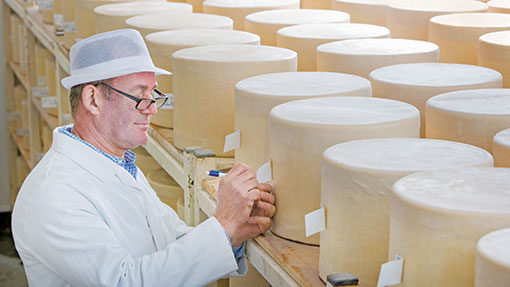Russia import ban raises fears of lower UK prices
 DO NOT RE-USE
DO NOT RE-USE Russia’s decision to ban food imports from Western countries has raised fears of lower prices among UK farmers and businesses.
Britain exports relatively small amounts of farm products to Russia, but analysts have said the extra meat and dairy supplies around the world needing new buyers could dampen prices across Europe.
Last year, Russia was the EU’s second biggest customer for agricultural products – accounting for almost 10% of shipments and worth about £8.8bn.
Fruit and vegetables made up most of the exports, followed by dairy commodities, pork and beef.
In 2013, the UK’s top direct exports were £5.4m of cheese and £1.5m of poultrymeat – both less than 1% of total trade.
NFU deputy director-general Martin Haworth said the timing was worrying as most farmgate prices in the UK had already seen significant falls in the past year.
“Any further downward pressure can only exacerbate problems,” he said.
EU agriculture commissioner Dacian Ciolos said a crisis reserve fund was ready to help farmers.
Beyond the EU, agricultural exports to Russia from the USA, Australia, Canada and Norway have also been stopped.
The European dairy industry could suffer the biggest shock, as Russia buys 27% of the EU’s cheese exports and 19% of its butter.
Strong milk production and weaker demand from the Far East has sent world wholesale prices tumbling by 40% since February.
British companies have already been affected: co-op Arla has stopped producing cheese and butter for Russia, which account for about 1.3% of its sales, and cheesemakers Wyke Farm and Belton Cheese have had to stop shipments.
Wyke Farm managing director Richard Clothier said the ban could jeopardise the hard work it had taken to gain market access.
“It is a growing, affluent market that the UK is ideally suited to supply with premium products,” he said.
“Disruption for a year could lose us business for five or 10 years.”
Effect of Russia’s food import ban sector-by-sector
- Dairy – The ban should have “little direct impact” on the UK, DairyCo says. Russia buys less than 1% of the UK’s cheese, butter and skim-milk powder. However, there could be some downward pressure on wholesale prices through their link with EU markets, as the loss of the trade for big exporters, such as the Netherlands, Germany and Poland, could see a rise in available stocks. This effect could be temporary while Russia finds new suppliers and the European dairy products find new destinations.
- Pork – EU pork has been banned from Russia since early 2014 after reports of African swine fever in Eastern Europe, so Bpex predicts the effect on the EU and UK to be limited. Canada could suffer the most, but the competition on world markets could knock-on to European prices.
- Beef and lamb – The UK signed a beef and lamb trade deal with Russia in September last year but did not ship any red meat there. The UK is 77% self-sufficient for beef and 98% for lamb so the main concern will be greater competition in export markets such as Europe.
- Other sectors – Europe’s fruit and vegetable production has been hit particularly hard, losing its biggest export market, worth more than €2bn (£1.6bn). However, the UK’s exports last year totalled only about £1m. UK fish farmers will also suffer, as they sold £17m of frozen fish to Russia in 2013.
